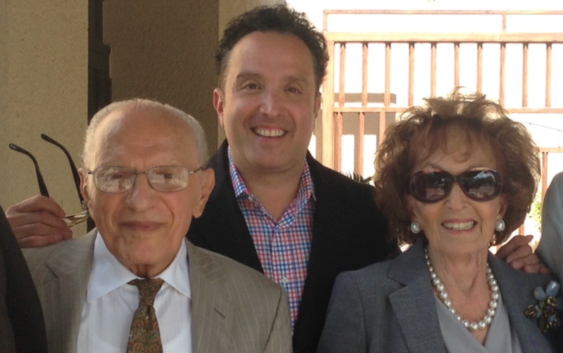- Asheville's resilient lodges welcome back travelers after Hurricane Helene
- Austin leaders consider expanding wildfire protection plan
- Large hail, strong winds and tornado threat possible into Thursday evening
- Large hail, tornado threat possible Thursday evening
- 'Welcome to Aggieland Atlantis': Texas college town floods during finals week
Emilio Nicolas, Media Pioneer And Founder of Univision, Dies At 88

Emilio Nicolas, the businessman who built the largest Spanish-language television network in the United States, died on Saturday. He was 88.
Emilio Nicolas and his wife Irma were a media power couple.
Irma’s father, Raoul Cortez, started the first full-time Spanish-language radio and television stations in the U.S. in San Antonio: KCOR AM & TV.
Guillermo Nicolas, son of Emilio and Irma, says his grandfather Raoul was charming, handsome, and determined.
“Who opens a Spanish language radio station in ‘46 and then in ‘55 a TV station in a country that speaks predominantly English [and] that has signs that say ‘no dogs or Mexicans allowed?’ ” he asked.
Emilio Nicolas, a Mexican immigrant from Frontera, Coahuila, came to work for Cortez at KCOR in 1955.
He picked up his father-in-law’s pioneering spirit when Cortez sold the station to Nicolas and other investors in 1961. KCOR became the forerunner to Univision.
Emilio and Irma Nicolas eventually made Spanish language radio and TV programming the norm for today’s audiences.
Guillermo says despite the success of his father’s efforts, Nicolas remained humble and loyal to his San Antonio ties.
“Dad really doesn’t have a big ego,” Guillermo Nicolas said, “because if he did we would have moved to New York or to Los Angeles. But Dad could have taken any one of those two cities for himself, and he didn’t. He chose to stay in San Antonio because he had a true love for San Antonio. This is where he received his education. It’s where he met my mother, and it’s where he found his fortune.”
Through it all, Nicolas kept a low profile until he sold the company in 1987.
“And not until then did he get floods of phone calls from people that had known him for 40 years and were stunned at what he had achieved and what his partners had achieved,” Guillermo Nicolas added. “And I find that wonderful on one part and really sad on the other, because in his own city, to not know what he had created, and that he’d built the fourth television network in the United States after ABC, CBS and NBC. That to me was a little sad.”
Nicolas knew Mexican Americans had no voice or representation in the media. There was nowhere they could go to learn about getting a driver’s license, how to register to vote or how to learn about transformative figures like Cesar Chavez.
“He understood as a Mexican immigrant coming to San Antonio to the United States that having control of the airwaves was a privilege, not a right,” Guillermo Nicolas explained. “And that the airwaves belong to the people of the United States, not to the companies and to the broadcast companies. And it was important to him not only to entertain the people, but to help educate, because we had a struggle ahead of us. I mean, the radio and the television is how our people were able to learn about their great heroes.”
Texas Public Radio’s new headquarters will carry on the Nicolas’ legacy. It will be named The Emilio & Irma Nicolas Media Center.
This is a developing story. More details to come.
Norma Martinez can be reached at Norma@TPR.org and on Twitter at @NormDog1.